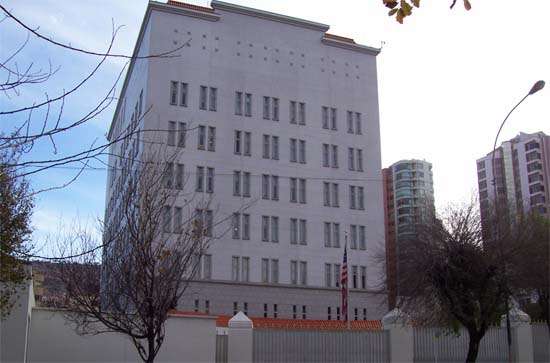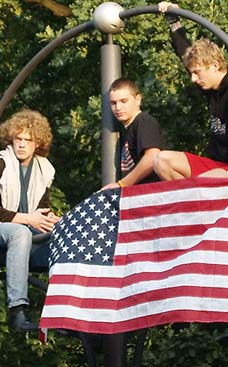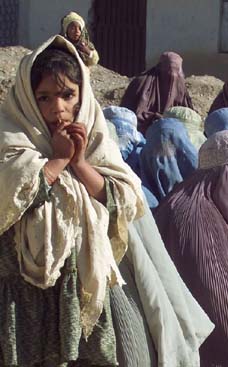
"There had been a number of incidents. There was the incident with the Peace Corps and the Fulbright scholar [asked to spy by the U.S. Embassy]. And then there are the meetings between the ambassador and the opposition. Obviously he's the ambassador: he should meet with everybody. But the way he did and the timing of it was considered unfriendly. I think you have a bigger structural problem, which is that you have USAID funding groups in Bolivia but they won't disclose who they are. They are doing this now in Venezuela too. These are polarized countries. So on that basis both of these governments [Bolivia and Venezuela] just assume that Washington is doing what it has always done, which is to fund the people that they are sympathetic to."
Mark Weisbrot says: I think that this thing was coming for a long time. There had been a number of incidents.
Revolt of the Rich
Despite winning last month's recall election, President Evo Morales faces escalating violence from protesters who don't want to share the nation's natural-gas wealth.
By Michael Miller | Newsweek Web Exclusive
Sep 13, 2008 | Updated: 1:09 p.m. ET Sep 13, 2008
Relations between Bolivia's President, Evo Morales, and the country's wealthy easterners were tense from the start. Since Morales's election in 2005, the eastern provinces, known as the "Media Luna," or half moon, which have grown rich on natural gas, have fought bitterly over a new constitution that would redistribute some of that wealth to the western provinces. The opposition has requently waged disruptive strikes. Protests began to take a more violent turn after Morales trounced the opposition in last month's recall election. This week at least eight Bolivians were killed in clashes. Opposition groups blew up part of a natural gas pipeline and vandalized government offices, causing millions of dollars worth of damage. They have also succeeded in disrupting trade with Brazil and Argentina, which rely on Bolivia's natural gas.
Relations between Bolivia and the United States have quickly deteriorated as well. Bolivia expelled U.S. ambassador Philip Goldberg for "conspiring against democracy" and in response the Bush administration sent the Bolivian ambassador in Washington packing. In a show of support, Hugo Chavez, Venezuela's president and staunch Evo ally, ejected the American envoy from Caracas. On Friday, Morales sent troops into the eastern provinces to restore order. To find out where it's all headed, Newsweek's Michael Miller talked with economist and Bolivia expert Mark Weisbrot, co-director of the Center for Economic and Policy Research in Washington, D.C. Excerpts:
Newsweek: How serious is the fallout between the United States and Bolivia?
Weisbrot: I think it's serious. I think that this thing was coming for a long time. There had been a number of incidents. There was the incident with the Peace Corps and the Fulbright scholar [asked to spy by the U.S. Embassy]. And then there are the meetings between the ambassador and the opposition. Obviously he's the ambassador: he should meet with everybody. But the way he did and the timing of it was considered unfriendly. I think you have a bigger structural problem, which is that you have USAID funding groups in Bolivia but they won't disclose who they are. They are doing this now in Venezuela too. These are polarized countries. So on that basis both of these governments [Bolivia and Venezuela] just assume that Washington is doing what it has always done, which is to fund the people that they are sympathetic to.
How much influence do eastern Bolivia's large estate owners have? What kind of pressure do opposition groups exert in Bolivia?
Quite a bit. That's what this conflict is really about. You have the most concentrated land ownership in almost the entire world in Bolivia, with around two thirds of the land owned by six tenths of one percent―not even one percent―of the landowners. Obviously Evo Morales ran on a platform of land reform. He is not talking about confiscating huge amounts of land, but there is going to be some redistribution. There is the hydrocarbon revenue, which goes disproportionately to the Media Luna states with the opposition governors. So those are the two big economic reasons for this conflict.
Which one, land or hydrocarbons, is really the central issue?
That is a tough question. The hydrocarbons are more immediate because [the government has] already begun some redistribution there. Morales has not touched the landowners. So I guess you could say that [hydrocarbons] are the bigger issue.
I was in Bolivia a couple months ago and I met with the Central Bank and the ministries. The government has $ 7 billion in reserves right now in the Central Bank, which is an awful lot [considering] their whole GDP is only $13.2 billion. Most of it is owned by the prefectures, the provinces, so they have a lot of money. So it is hard to explain why they would raise such a fuss over the government wanting to take a small part of that and use it for some pensions
for people over 60, which also goes to their own residents.
How does this tie into the recent recall election in Bolivia? Wasn't that election meant to resolve this impasse between the Morales government and the opposition provinces?
It did show some things. First of all, Morales got 67 percent of the vote, which is as big as you get in politics in the world without fixing the election. And the other thing it showed is if you look at the Media Luna provinces, while it's true that the opposition won, the vote for Morales also went up enormously as compared to what he got in 2005. So his support, his mandate, really increased quite a bit since the 2005 election. What you are seeing right now is that the people who could not win anything at the ballot box are trying to use other means. They are cutting off the gas, which is very serious.
What are the financial consequences of opposition groups disrupting Bolivia's natural gas pipeline?
It's huge. It's more of a problem for Brazil than it is for Bolivia: they get half their gas from Bolivia and more than half in the industrial region of Sao Paolo. For Bolivia it is quite a lot of money. It is a $100 million estimated just to fix [the gas pipeline] and $8 million per day of revenue lost as well. But it is even worse than that because the opposition can really sabotage the whole economy. Everything that the government is doing in terms of the next five years as far as extending gas supply to Brazil and Argentina, if Bolivia can't be a reliable gas supplier then those countries are going to have to look elsewhere. So it is a form of serious sabotage. The [Morales government] is calling it "terrorism."
Will Morales's mandate enable him to act more forcefully toward the breakaway provinces or is he going to have to wait for the constitutional referendum in December?
I think he is going to have to do something. The government has been very pacifist and I think they don't get enough credit for that. Most governments in the world would have sent in the military in force and a lot of people would have been killed. He has been extremely restrained. He has tried to avoid violence at all costs and the opposition has been emboldened by that. They just keep escalating. Now they are taking it to a different stage and I don't know how much more the government can just try to ignore it. They really depend on these gas exports, as do Brazil and Argentina. Brazil issued a statement the other day that said they will not tolerate an interruption in the constitutional order in Bolivia. Whether that means they will send troops, I don't know.
Does this have a financial impact on the United States? Or is the decision to expel the Bolivian ambassador simply a quid pro quo response? Is there real money at stake for the United States?
I don't think there is really anything at stake for the United States. If [by antagonizing Morales] they push Chavez too far, there is always the chance that he could cut off oil. But it is unlikely.
What type of fallout will there from Morales' use of troops in the eastern provinces?
It depends on what the [government forces do] and on their capacity for crowd control and using non-lethal weapons. Look at what happened prior to Morales: they are still trying to extradite the former president [Gonzalo Sanchez de Lozada] for all the people who were killed in the demonstrations back then. Morales has been on the other side of this and he knows that things can get out of control. So he is trying to do everything to avoid that but it's not easy when you have an opposition that is not operating by the same rules.
© 2008













